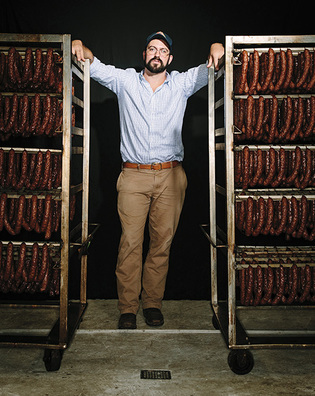 loading
loading
featuresCharlie Munford: sausage from the wildCharlie Munford ’06, ’11MFS, is turning an invasive species—wild boar—into smoked sausage.  Edmund D. FountainCharlie Munford ’06, ’11MFS, shown here in his smokehouse plant near New Orleans, turns pigs running wild into sausage. View full image“I kind of admire the scrappy little buggers,” says Charlie Munford ’06, ’11MFS, of the feral pigs he turns into a mainstream artisanal sausage. “They’re out there surviving.” Munford is the founder of Charlie’s Wild Boar Smoked Sausage, which debuted this year. The smokiness is deep but not overwhelming, the flavor smoother and not too gamy. It’s perfect in a pot of red beans, or chicken and sausage gumbo. In Louisiana, a state obsessed with food and rich in sausage tradition, the product is already in 70 supermarkets statewide. Sales have tripled in the last three months. But this sausage is remarkable for another reason: it’s helping to solve one of the state’s huge environmental problems. Customers become part of the effort to control the invasive tide of 600,000 feral swine that root up Louisiana levees and crops, destroy wetlands and wildlife, and cause $40 to $60 million in damage every year. “From the beginning, our mission statement has been to promote sustainable agriculture,” Munford says. “At the same time, I’m a capitalist.” Munford grew up in Jackson, Mississippi, where he learned to love farming on his grandfather’s property. He had a pet pot-bellied pig named Mr. T and tended a backyard garden. After earning his master’s in forest science, he headed home in 2011. “I decided in graduate school I didn’t want to be a scientist. I wanted to develop something to promote sustainable agriculture, not just write papers about it.” That led him to found Two Run Farm and to start what he calls “all these wacky projects.” First, he looked for an underutilized resource to exploit. On the many vast tracts where loblolly pines are raised, underbrush is controlled with herbicides. Munford tried a cheaper way: grazing sheep and goats. But his company lacked the capital for the venture, so they started selling the lambs and kids. Soon he was selling locally grown beef, goat, pork, and lamb to major New Orleans chefs. Customers included Emeril Lagasse’s signature restaurant. And Munford bought a slaughterhouse of his own. He had learned that farmers were paying trappers to eliminate wild pigs, often by shooting them and leaving the carcass in the woods—another wasted resource. Then the state’s agriculture department suggested his slaughterhouse become the first to harvest wild boar. Munford still sells to restaurants, though now most of the meat is wild boar. But he needed another product, and he wanted to connect more directly with the end user. He replicated a traditional Cajun smokehouse, to get the effect of logs burning on a dirt floor under sausage coils hanging from the rafters. Charlie’s Smoked Sausage was born. “I believe in this program,” says Munford. “I’m glad to be able to help keep the population in check, to be able to help provide some income to farmers and trappers trying to take better care of their land. I know it’s doing good for the environment and people.” Still, Munford confesses that Mr. T has left his mark. “He was a dear friend of mine. I’m a little bit conflicted about slaughtering pigs.”
The comment period has expired.
|
|